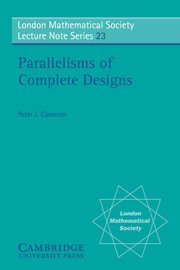Summary
Through the unknown, remembered gate
When the last of earth left to discover
Is that which was the beginning
(T. S. Eliot: Little Gidding)The notion of ‘parallelism’ has always played an important role in mathematics. Euclid's famous ‘parallel postulate’ (in the form, due to Proclus, known as ‘Playfair's axiom’) asserted that, given any line and any point in the plane, the given point lies on a unique line parallel to the given line. A long history of controversy surrounded the question of whether this postulate is self-evident, or even necessarily true. The controversy was laid to rest when it was demonstrated that ‘noneuclidean geometries’, in which Euclid's postulate fails, are valid objects of mathematical study.
The point of view in this book is the opposite of that of noneuclidean geometry, which abandons the parallel postulate while retaining the other geometric axioms. The parallelisms studied here satisfy the parallel postulate, but all other restrictive conditions are cleared away; in place of geometric ‘lines’, I consider all subsets of the point set X which have cardinality t, for some given integer t. Thus the parallel relation is the only structure these ‘geometries’ possess.
The book is largely self-contained. Each chapter except the last is followed by one or more appendices treating topics relevant to that chapter. A glance at the titles of the appendices shows that the theory of parallelisms draws on (and often enriches) such diverse areas of finite mathematics as network flows, perfect codes, designs, Latin squares, and multiply-transitive permutation groups.
- Type
- Chapter
- Information
- Parallelisms of Complete Designs , pp. 1 - 3Publisher: Cambridge University PressPrint publication year: 1976

